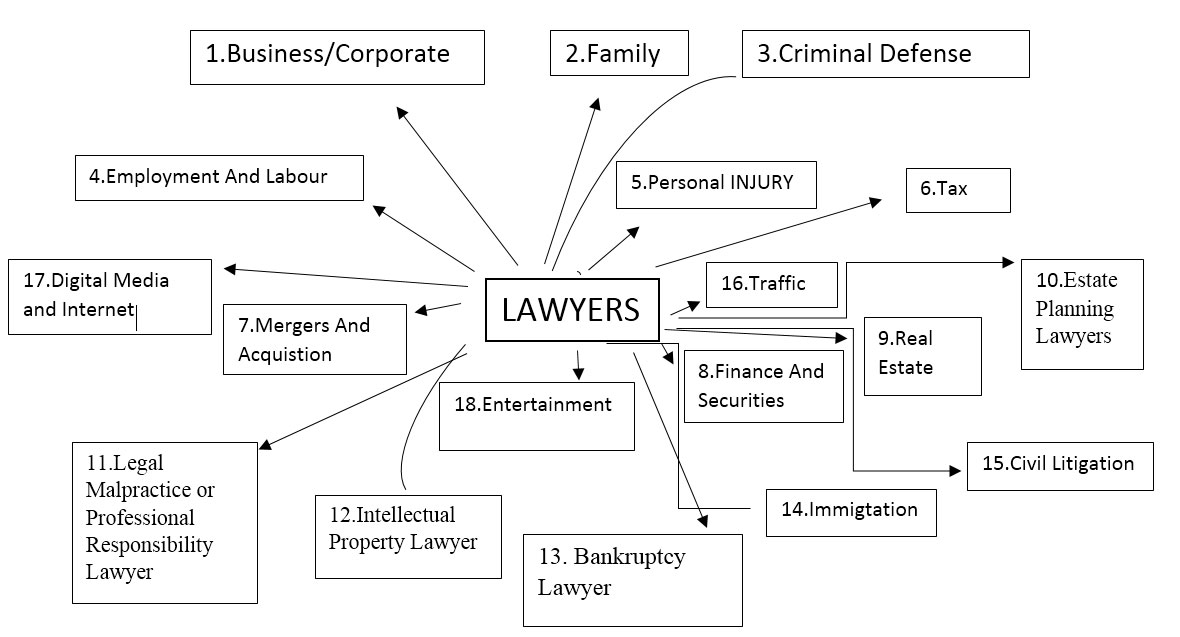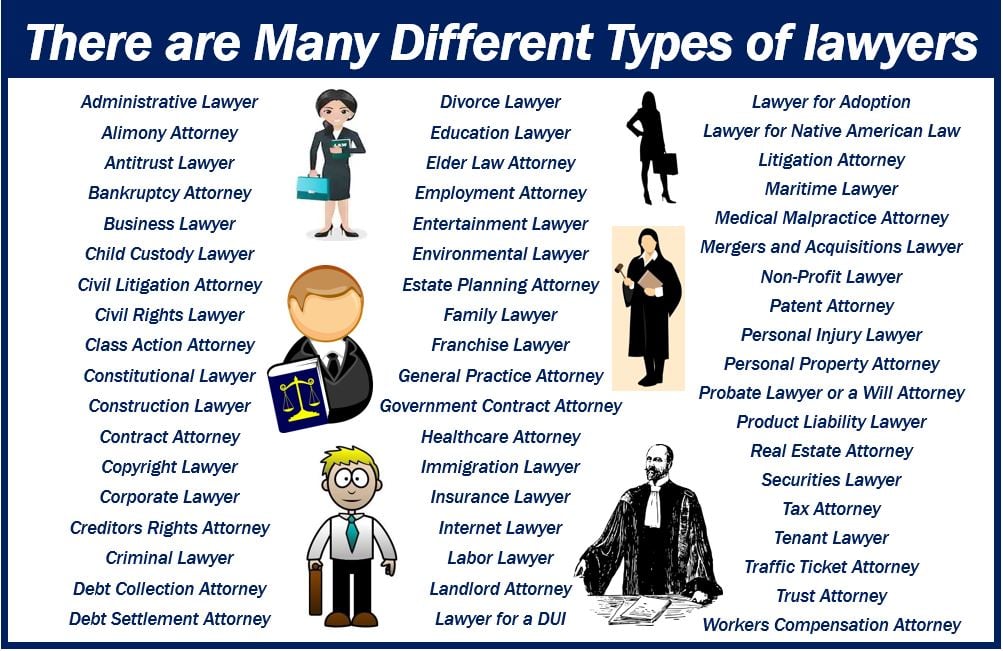What Are The Different Types Of Attorneys?
The legal landscape is a complex tapestry woven with countless threads of specialized expertise. Navigating this intricate web requires understanding the diverse roles of attorneys, each trained to address specific legal needs. From safeguarding individual rights in criminal cases to guiding businesses through intricate transactions, attorneys act as crucial advisors and advocates in various legal arenas.
This guide explores the vast array of legal specialties, providing a comprehensive overview of the different types of attorneys and their unique roles in the legal system. We’ll delve into the world of criminal law, civil law, business law, and other specialized areas, shedding light on the essential services these legal professionals provide.
Criminal Law Attorneys
Criminal law attorneys specialize in representing clients accused of crimes, navigating the complexities of the criminal justice system, and advocating for their rights. They play crucial roles in ensuring fairness and due process for those facing criminal charges.
Types of Criminal Law Attorneys
Criminal law attorneys can be broadly categorized into three main types: public defenders, prosecutors, and private criminal defense attorneys. Each type of attorney has distinct roles and responsibilities in the criminal justice system.
Public Defenders
Public defenders are court-appointed attorneys who represent individuals who cannot afford private legal counsel. They are employed by the government and are tasked with ensuring that all individuals, regardless of their financial status, have access to legal representation in criminal cases.
- Public defenders are often assigned to clients facing a wide range of criminal charges, from minor offenses to serious felonies.
- They have a duty to zealously advocate for their clients’ rights, even when the charges are severe.
- They work to ensure that their clients receive a fair trial and are treated justly throughout the legal process.
- Public defenders often face heavy caseloads and limited resources, which can make it challenging to provide the same level of attention and resources as private attorneys.
Prosecutors
Prosecutors are attorneys who represent the government in criminal cases. Their primary role is to investigate alleged crimes, gather evidence, and present cases against defendants in court.
- Prosecutors are responsible for determining whether to file criminal charges against individuals and for deciding the specific charges to be pursued.
- They work closely with law enforcement agencies to investigate crimes and gather evidence.
- Prosecutors are expected to act fairly and ethically in their pursuit of justice.
- They have a duty to ensure that all defendants receive a fair trial and that the rights of victims are protected.
Private Criminal Defense Attorneys
Private criminal defense attorneys are hired by clients to represent them in criminal cases. They provide legal advice and representation to individuals facing criminal charges, working to protect their rights and secure the best possible outcome for their clients.
- Private defense attorneys can specialize in specific areas of criminal law, such as drug offenses, white-collar crimes, or violent crimes.
- They have the flexibility to choose their clients and cases, unlike public defenders.
- They typically charge fees for their services, which can vary depending on the complexity of the case and the attorney’s experience.
- Private defense attorneys are expected to be skilled negotiators and advocates, working to achieve the best possible outcome for their clients, whether that is a dismissal of charges, a plea bargain, or a favorable verdict at trial.
Business Law Attorneys

Business law attorneys are legal professionals who specialize in advising businesses on legal matters. They help businesses navigate the complex legal landscape, ensuring compliance with laws and regulations, and protecting their interests.
Types of Business Law Attorneys
Business law attorneys have specialized areas of expertise within the broader field. Some common types include:
- Corporate Lawyers: These attorneys advise businesses on matters related to their structure, governance, and operations. They handle tasks such as incorporating businesses, drafting corporate bylaws, and advising on shareholder rights.
- Contract Lawyers: Contract lawyers specialize in drafting, reviewing, and negotiating contracts for businesses. They ensure that contracts are legally sound, protect their client’s interests, and minimize potential risks.
- Intellectual Property Lawyers: Intellectual property (IP) lawyers protect businesses’ valuable assets, such as trademarks, patents, and copyrights. They help businesses register and enforce their IP rights, and advise on IP licensing and infringement issues.
Other Legal Specialties

While the legal field is broad, there are many other legal specialties that lawyers can specialize in. These specialties focus on specific areas of law and require specialized knowledge and experience. These specialists handle legal issues that affect individuals, businesses, and the environment.
Tax Law
Tax law is a complex and ever-changing field that requires specialized knowledge of tax codes, regulations, and case law. Tax lawyers advise individuals and businesses on tax planning, compliance, and litigation. They help clients minimize their tax liability, navigate tax audits, and resolve tax disputes.
Environmental Law
Environmental law is a growing area of law that focuses on protecting the environment and public health. Environmental lawyers work to ensure compliance with environmental regulations, represent clients in environmental litigation, and advocate for environmental protection policies. They may handle cases involving pollution, waste management, and endangered species.
Immigration Law
Immigration law is a complex area of law that governs the entry, stay, and citizenship of non-citizens in a country. Immigration lawyers help individuals and families navigate the immigration process, obtain visas, and apply for citizenship. They also represent clients in deportation proceedings and asylum cases.
Labor Law
Labor law governs the relationship between employers and employees. Labor lawyers advise employers and employees on issues such as wages, hours, working conditions, and unionization. They also represent clients in labor disputes, such as unfair labor practices and wrongful termination cases.
International Law
International law governs the relationships between countries and international organizations. International lawyers advise governments, businesses, and individuals on international treaties, trade agreements, and human rights law. They also represent clients in international disputes, such as trade disputes and human rights violations.
Choosing the Right Attorney
Finding the right attorney for your legal needs is crucial, as it can significantly impact the outcome of your case. An attorney can provide expert guidance, legal advice, and representation in court. Choosing the right attorney involves careful consideration of your legal needs, budget, and the attorney’s experience and expertise.
Steps Involved in Selecting an Attorney
Choosing the right attorney is a critical step in addressing any legal issue. A well-structured approach ensures that you find an attorney who is qualified, experienced, and a good fit for your needs. Here’s a flowchart outlining the steps involved in selecting an attorney:
- Identify Your Legal Needs: The first step is to clearly define the legal issue you are facing. What type of legal help do you need? For example, are you facing a criminal charge, a business dispute, or a family law matter?
- Research Attorney Specialties: Once you have identified your legal needs, research different attorney specialties. Look for attorneys who specialize in the specific area of law relevant to your situation. For example, if you are facing a criminal charge, you would need a criminal defense attorney.
- Seek Referrals: Ask friends, family, colleagues, or other professionals for referrals to qualified attorneys. Networking and seeking recommendations from trusted sources can be an excellent way to find a competent attorney.
- Use Online Legal Directories: Utilize online legal directories, such as Avvo, Martindale-Hubbell, or FindLaw, to search for attorneys in your area. These directories often provide information on attorneys’ experience, credentials, and client reviews.
- Contact Attorneys: Once you have identified a few potential attorneys, contact them to schedule a consultation. During the consultation, discuss your legal issue, ask questions about their experience, fees, and approach to your case.
- Evaluate Attorneys: After meeting with several attorneys, evaluate their qualifications, experience, communication skills, and overall fit for your needs. Choose an attorney who you feel comfortable working with and who you believe can effectively represent your interests.
Tips for Finding Qualified Attorneys
Finding a qualified and experienced attorney can be challenging, but it is essential to ensure that your legal needs are met effectively. Here are some tips to help you find the right attorney:
- Check Attorney Credentials: Verify the attorney’s license to practice law in your state. You can find this information on the website of your state’s bar association.
- Review Attorney Experience: Look for attorneys who have experience handling cases similar to yours. Ask about their success rate in similar cases and inquire about their approach to your specific legal issue.
- Read Client Reviews: Check online legal directories and websites for client reviews of potential attorneys. Client reviews can provide valuable insights into an attorney’s reputation, communication style, and effectiveness.
- Consider Attorney Fees: Discuss attorney fees and payment arrangements upfront. Ensure that you understand the attorney’s billing structure and any potential additional costs.
- Trust Your Instincts: Ultimately, choose an attorney you feel comfortable with and who you believe can effectively represent your interests. It is essential to have a good rapport with your attorney and to feel confident in their abilities.
Epilogue

Understanding the different types of attorneys empowers individuals and businesses to navigate legal challenges with confidence. By recognizing the unique expertise each specialty offers, you can make informed decisions when seeking legal counsel. Whether facing a criminal charge, navigating a personal injury claim, or launching a new venture, the right attorney can be your invaluable guide, ensuring your rights are protected and your interests are represented effectively.